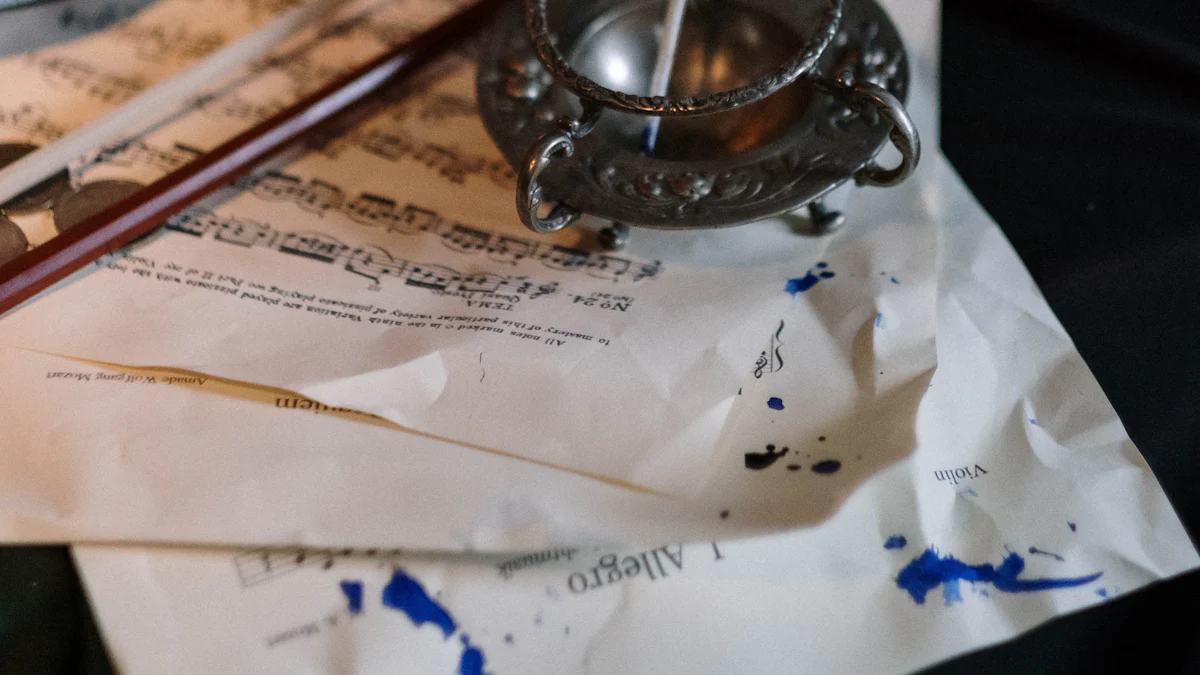Check out the latest in the field of Music, Art & Culture with tablaperfumer
Blog
Articles, News & Updates
10000 hours to perfection!

Have you ever come across the 10,000-hour rule? This concept proposes that achieving mastery in a skill, such as music practice, necessitates 10,000 hours of rehearsal. But is this really applicable to every musician? Some leading violinists at Berlin's Academy of Music hit this mark by the age of 20. However, not every musician takes the same journey. Why concentrate only on the hours when the quality and effectiveness of practising could be more significant? Let's delve into whether riyaz genuinely requires such an extensive time commitment.
Understanding the 10,000-Hour Rule in Music

The 10,000-hour rule has intrigued many aspiring musicians. This idea suggests that mastering a skill, like music, requires 10,000 hours of practice. But why do people believe in this rule? Let's explore its origins and application in music.
Origin of the 10,000-Hour Rule
Research by Anders Ericsson
Psychologist Anders Ericsson's research formed the basis for the 10,000-hour rule. Ericsson found that world-class performers often dedicated at least 10,000 hours to their craft. His studies showed that focused and deliberate practice played a crucial role in achieving expertise. Ericsson emphasized that quality mattered more than quantity. People who engaged in thoughtful practice saw better results. The findings suggested that effortful practice could lead to greatness.
Popularization by Malcolm Gladwell
Writer Malcolm Gladwell brought the 10,000-hour rule into the spotlight. In his book "Outliers," Gladwell points out that many successful people spent around 10,000 hours honing their skills. Gladwell's work made the concept popular among musicians and other artists. He argued that consistent practice was key to mastery. Gladwell's interpretation sparked debates about the necessity of this time commitment.
Application in Music Practice
Examples of Musicians and Practice
Many musicians have embraced the 10,000-hour rule. Some famous artists reportedly reached this milestone early in their careers. For instance, violinists at Berlin's Academy of Music often hit 10,000 hours by age 20. These examples show that dedication can lead to success. However, not all musicians follow the same path. Some achieve excellence with fewer hours of practice. Others may need more time to reach their goals.
Variability in Practice Needs
Musicians have different needs when it comes to practice. Factors like talent, environment, and resources influence the amount of time required. Some people learn quickly and efficiently. Others benefit from more extensive rehearsal. The 10,000-hour rule serves as a guideline rather than a strict requirement. Musicians should focus on effective practice strategies. Quality and purpose matter more than simply counting hours.
Critiques of the 10,000-Hour Rule
The 10,000-hour rule has sparked debates among musicians and experts. Why do some people question its validity? Let's explore the limitations and alternative views on this popular concept.
Limitations of the Rule
Individual Differences in Learning
Every musician learns differently. Some people grasp concepts quickly, while others need more time. The 10,000-hour rule doesn't account for these differences. David, a young pianist, might master a piece in half the time another student requires. Talent plays a significant role in how fast someone learns. A talented individual might not need as many hours to achieve the same level of proficiency. The rule oversimplifies the learning process by ignoring personal variations.
Quality vs. Quantity of Practice
Quality matters more than quantity when it comes to practice. Simply spending hours on an instrument doesn't guarantee improvement. Effective practice involves focus, feedback, and deliberate effort. David, for instance, might spend fewer hours practicing but with greater intensity and purpose. This approach often leads to better results. Malcolm Gladwell, the writer who popularized the rule, acknowledges that the 10,000 hours should be focused and effortful. Musicians should prioritize meaningful practice over just clocking hours.
Alternative Views on Mastery
Role of Talent and Innate Ability
Talent cannot be ignored in the pursuit of mastery. Some musicians possess natural abilities that set them apart. David might have an innate sense of rhythm or perfect pitch. These talents can accelerate the learning process. Not everyone needs the same amount of practice to excel. Malcolm Gladwell suggests that the rule is a subjective standard. The measurement of success varies among individuals. Talent often determines how quickly someone reaches their goals.
Influence of Environment and Resources
Environment and resources significantly impact a musician's journey. Access to quality instruments, teachers, and supportive communities can make a difference. David might thrive in a music-rich environment with ample opportunities. Others might struggle due to limited resources. Dr. K. Anders Ericsson, whose research inspired the rule, notes that musicians often require more than 10,000 hours to reach elite levels. The environment shapes the path to mastery. Musicians should consider these factors when evaluating their progress.
Real-World Examples and Case Studies

Successful Musicians with Less Practice
Case Study 1
Consider the story of David Bradley, a young pianist who defied the conventional wisdom of the 10,000-hour rule. David practiced with intense focus and purpose, often spending only a couple of hours each day on his piano. His practice sessions were short but packed with deliberate exercises and feedback from mentors. By age 16, David had won several prestigious competitions, showcasing that quality practice can outweigh sheer quantity. His journey highlights how effective strategies can lead to success without reaching the 10,000-hour mark.
Case Study 2
Another fascinating example involves a group of musicians from Florida State University. These students engaged in a study that challenged the necessity of extensive practice hours. The study revealed that many of these musicians achieved professional-level skills with less than 10,000 hours of practice. They focused on targeted exercises and received guidance from experienced instructors. This approach allowed them to excel in their craft without the overwhelming time commitment. Their success story emphasizes the importance of structured and purposeful practice.
Musicians Who Followed the Rule
Case Study 3
Some musicians adhere strictly to the 10,000-hour rule, believing it is essential for mastery. One such musician is a renowned violinist who began practicing at a young age. By age 20, this violinist had accumulated over 10,000 hours of dedicated practice. The violinist's routine involved solitary practice sessions, often exceeding four hours daily. This dedication paid off, leading to international recognition and numerous awards. The violinist's story illustrates how the 10,000-hour benchmark can serve as a valuable guideline for those seeking elite status.
Case Study 4
Legendary guitarists have also embraced the 10,000-hour rule. Many iconic guitarists spent at least four hours a day honing their skills. Their commitment to practice extended beyond the typical daily routine, often reaching six or more hours. This relentless dedication contributed to their virtuoso status and set them apart from their peers. The stories of these guitarists demonstrate that while the 10,000-hour rule may not be a strict requirement, it can provide a framework for achieving excellence in music.
The Role of Good Practice and Rehearsal
Musicians often wonder why some people seem to excel with fewer hours of practice. The secret lies in how you approach your practice times. Let's explore effective strategies and the impact of your musical environment.
Effective Practice Strategies
Deliberate Practice Techniques
Deliberate practice involves focusing on specific areas that need improvement. You might wonder why deliberate practice is so important. The answer lies in its ability to target weaknesses and transform them into strengths. Musicians who engage in deliberate practice often see faster progress. For instance, a pianist might spend dedicated time on challenging pieces rather than playing familiar tunes. This focused approach helps build skill and confidence.
Researchers have found that alternating practice with rest can enhance learning. Your brain needs time to absorb new information. Practicing for hours and hours without breaks can lead to burnout. Short, intense sessions with breaks can be more effective. Think about how your computer processes data. It needs time to cool down and reset. Your brain works in a similar way.
Importance of Feedback and Guidance
Feedback plays a crucial role in improving your skills. Imagine trying to learn a new skill without any guidance. You might struggle to identify mistakes or areas for improvement. Teachers and mentors provide valuable insights that help refine your technique. Constructive feedback can guide you toward better performance. Musicians who seek feedback often achieve greater success.
Guidance from experienced musicians can give you a fresh perspective. You might discover new techniques or approaches that enhance your practice. Teachers can also help you set realistic goals and track your progress. This support system can make a significant difference in your journey to mastery.
The Impact of Musical Environment
Supportive Communities
Your environment can greatly influence your musical journey. Supportive communities provide encouragement and motivation. Being part of a group with similar interests can inspire you to practice more. You might find opportunities to collaborate and learn from others. A positive environment fosters creativity and growth.
Think about how a garden thrives with the right conditions. Plants need sunlight, water, and nutrients to flourish. Musicians need a nurturing environment to reach their full potential. Surrounding yourself with like-minded individuals can boost your confidence and drive.
Access to Resources and Opportunities
Access to resources can shape your musical path. Quality instruments and materials can enhance your practice experience. Imagine trying to learn on a broken instrument. Frustration might hinder your progress. Having the right tools can make practice more enjoyable and effective.
Opportunities for performance and exposure can also impact your growth. Participating in concerts or competitions can boost your confidence. These experiences provide valuable feedback and help you gauge your progress. Musicians who seize these opportunities often achieve remarkable success.
Musicians often wonder about the necessity of the 10,000-hour rule. The rule suggests that mastery requires extensive practice. However, the journey to excellence involves more than just hours. Quality practice and deliberate effort matter more. Musicians should focus on effective strategies rather than counting hours. Talent and environment also play crucial roles. The 10,000-hour rule serves as a guideline but not a guarantee. Musicians can achieve greatness through focused practice and dedication. Embrace your unique path to mastery in music.
Check Your Knowledge. Take the test


